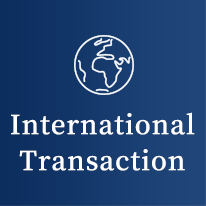Method of Settlement (Terms of Settlement) in International Trade Contracts
Settlement Methods in International Transactions
The method of settlement is an important requirement for international transactions. In sales contracts and other general transaction agreements, there are several typical patterns of settlement methods, and it is necessary to consider which method to use.
Wire Transfer
Wire transfer is a method in which the buyer remits settlement by wire transfer to a bank account designated by the seller. Although some procedures are required, such as writing the purpose of remittance on a foreign remittance transfer request form at the bank counter, it is a simple method of settlement. However, from the foreign seller’s point of view, if the settlement method is based on the end of the month and settlement is made at the end of the following month, while the goods are delivered in advance, the buyer may be concerned whether he will actually pay for the goods, and the seller may have to bear the risk of the buyer’s bankruptcy. Therefore, the use of wire transfer is limited to cases where the relationship of trust between the parties is fairly solid, and unlike domestic transactions, settlements are usually made in a short period of time. In addition, the seller must constantly check the credit status of the buyer, and in some cases, it may be necessary to set contractual terms that allow for the immediate cancellation of the transaction.
Contractual Clauses for Wire Transfer
Licensee shall pay commissions by means of telegraphic transfer (T/T) remittance to the bank account designated by Licensor from time to time. The commission incurred from January 1 to June 30 shall be paid on or before the end of July, and commissions incurred from July 1 to December 31 shall be paid on or before the end of January.
Settlement by letter of credit
In international trade, settlement is often made by Letter of Credit (L/C). In the case of a Japanese company purchasing goods from an American vendor, the transaction by LC is as follows. The Japanese bank (the bank that opened the LC) opens the LC based on a request from the Japanese company (importer) and sends it to the bank in the exporting country (the U.S.). The U.S. bank notifies the seller (U.S. company) that the letter of credit has arrived, and the seller prepares documents in accordance with the letter of credit. Documents to be prepared by the seller include a bill of lading (B/L) issued by the shipping company in exchange for the cargo, an insurance policy issued by the insurance company that underwrote the marine insurance, and a bill of exchange issued by the seller. The U.S. bank confirms that these documents match the description of the LC and purchases the bill of exchange from the seller in exchange for these securities. The U.S. bank sends these securities and the bill of lading to the Japanese bank that opened the LC and requests settlement for the bill, and the Japanese bank that opened the LC delivers the bill of lading and bill of exchange to the importer in exchange for settlement from the importer. The Japanese importer receives delivery of the goods from the shipping company in exchange for the bill of lading, etc. In transactions using LC, the exporter can receive settlement for the goods from the local financial institution (actually, purchase of the bill of lading) by delivering the goods to the shipping company and preparing documentation in accordance with the terms of the LC. , so the settlement can be received promptly after the delivery of the goods, and the guarantee of the opening bank allows you to receive settlement without having to check the credit status of the buyer, so you can conduct the transaction with peace of mind.
Confirmation of the settlement method
Since the contents of the contract will differ depending on the method of settlement, it is necessary to fully consider the method of settlement.
Example of settlement method
Buyer shall pay Seller amounts of invoices on or before the end of the month that is one (1) month after the month in which the Products passed the Inspection. Each Party shall be responsible for any fees charged by its bank in connection with such wire transfers.
(Seller shall be responsible for any fees charged by its bank in connection with such wire transfers.)










